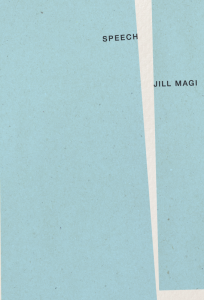by HUNTER AUGERI

Jill Magi, SPEECH (Nightboat Books, 2019), pp. 180.
Reading Jill Magi’s newest poetry collection SPEECH is like going for a walk inside someone else’s dream; the reader enters a landscape where the self becomes diffused and remixed into an assemblage of other bodies, overheard utterances, and the architecture that variously opens and closes off the city. Walking and writing are woven together as practices that mark the shift out of the conceptual and into the material. The poems are both about the city of Abu Dhabi and the author’s experience of walking through it. While some chapters contain essayistic glimpses into the geopolitics of the Middle East and mapmaking, the terse lines of poetry in SPEECH develop into a complex line of inquiry into the greater ontological figurations of the state and the body, and where the two intersect and inform one another. SPEECH is not just a cognitive mapping of a Middle Eastern city, but the unveiling of how one ingests a physical space and attempts to produce a poetic response—a simple act of speech.
Jill Magi has written six previous books of poetry and her critical work takes up a range of topics, including ecocriticism, cultural studies, and poetics. Magi is also an artist whose work merges these interests through experimental textile creations. In 2013, she joined the faculty of New York University Abu Dhabi where she teaches visual art and creative writing. SPEECH is a book-length poem that continually breaks form and style, revealing the tension of a multimedia artist working within the confines of a printed publication. Low-fidelity, serialized images occasionally appear in the text without explanation until the final part of the book, and in the opening of each chapter there is a quote from a range of texts, but most are centered around critical studies of the Middle East. The collage of prose, verse, partial quotes, and imagery feels discordant at moments, as if each piece is vying for attention and talking over one another. Just as you find a groove in the text, the chapter comes to an abrupt end and you find yourself in a different part of the city or listening in on a passing conversation. But all of this feels intentional and reflective of a pattern of inorganic 21st-century urbanism. Lines like sidewalks suddenly stop and the title of another poet’s poem slips into the text:
“as the clock beneath the clock
told the time
to turn decisions over
turn over every normal
right belief underwriting belief
to wake up knowing
abnormal coordinates
formed her own intersection
until sunset she
facing east
facing speech waking up after
wake up America! and
somebody blew up
America its map
over the map
the true of the diagonal
across the south
of the north.”
As Magi moves between exterior description and interior reflection, Amiri Baraka’s iconoclastic poem “Somebody Blew Up America” is reinvigorated as an decolonial ode and recontextualized within the purview of a woman walking down a city street in the United Arab Emirates. We are reminded that walking is a contact between two surfaces: body and land; and both of these entities are determined and limited by the state. As the pages unfold, an ontological map of the author’s self begins to take shape inside the geography of the city. The reader, in turn, navigates the tributaries of consciousness observed as vocative and peripatetic acts, all of which work to reconstruct the author’s experience of being with her surroundings and develop into a greater political awakening. Speaking and walking are rendered into political gestures, as primal acts of individuality and embodied citizenry. SPEECH is, at its roots, a poetics of civics.
Given its narrative of a specific city and chapters that move between poetry, prose, and image, Lisa Robertson’s 2004 book Occasional Work and Seven Walks from the Office for Soft Architecture comes to mind. In Robertson’s book a collection of essays reflecting on contemporary art, aesthetics, and architecture are seamed together and followed by a narrative of seven walks around Toronto. But departing from Robertson’s style, which feels more reflective and analytical, SPEECH moves at the pace of a walk as couplets unfold like steps that bring the reader forward. The lines of verse are derivative of an ambulatory physicality, and it is through bodily movement that Magi begins to discover the imprisonment of her own subjectivity, one that attempts to come into contact with the world around it. For Magi, walking is a mode of communication between spaces and people, an individual movement performed en masse, and a generator of verse. SPEECH is a reckoning with the self and its relation to its present condition under the state.
Magi’s book is a forceful reminder of the inequity of citizenry that exists between and within territories drawn up by imperial conquest. Throughout the book, Magi traces the historical legacy of mapmaking and searches for a sense of the commons in the present day:
“we
a part
sending the tale that travels
that maps a showcase
that we are not
here or there but trust
that everywhere
is a property
is a literature
a territory”
Magi’s “we” is annexed into parts that form a city composed of walls that divides “those who mostly worked with their hands from those who mostly worked at desks.” The walls Magi traverses along are literal and figurative interruptions of speech, and her own voice comes in to attempt a public utterance, a response to the collected aural landscape before her. Magi wrestles with the nature of privatization, one that begins with real estate but carries over into literary production.

The mass privatization of space and the destruction of the commons also destroys our capacity to imagine a “we” that is shared and accurately representative. One poem concludes with a series of questions concerning the body’s subjectivity: “Is my sovereignty linked to you representing me? / Do I think about sovereignty as I walk / as I write? / Am I free with my body or the state?” The question is not just whether one is interpolated into a subjectivity by the state, but if this subjectivity becomes inhabited and practiced by the individual. What is sovereignty if one adheres to a particular designation of how that sovereignty is enacted? Magi’s questioning of freedom relates back to the difficulty of representation within the text, the word (like the body under the state) is reduced to a placeholder for something else. Silence will always face the impossibility of its representation. Magi’s notion of speech as expression raises the significance of listening, of the impossibility of freedom of speech if the state determines how and when one can speak.
SPEECH raises important questions around how we’ve come to interpret the meaning of sovereignty and representation, and how they are enacted through vocalization. Magi carves out her own sphere for speaking from the surrounding architecture: “Not having their language / though they had hers / she kept place / built a ceiling / below the ceiling.” The poem continues by creating the haunting micro-reality of “a window in front of a window” and “the door behind / the door opening up / time to think.” What we find are more walls, more doors, more detachment of the self from physical reality. The self becomes encased in a body as a fortress against the state. While Magi is “making a city / making her,” her more tangible political critique finds a rhythm in a series of couplets:
“So to call a town friendly
draw a dotted line
below your neck below your
smile is a school district
a real estate name
redrawn
renamed
so as to drain
for profit
for one idea of fun
urbanism
a tourism
I mean to say that most
do not believe in equal
and will advocate for less
versus their progeny more—.”
The architecture of the city lays a geographical foundation that comes to inform the illusion of autonomy of an individual body. SPEECH reads as a biopolitical manifesto of the need to return to the shared experience of walking and talking, of being together as a public.
At a moment of civil awakening, when we are weighing the value of speaking against the cost of silence, and as we keep distance for our health and assemble to protest systemic racism, SPEECH can be read as part of an effort to understand the city as an infrastructure of disruption and silencing. The wave of protests across the country demonstrates the political vitality of disruption: it takes a mass of people and their human bodies to shut down a street, the flow of traffic comes to a halt so another voice can be heard. While SPEECH is not a work of protest, it is a declaration of a self and places the physical in conjunction with the vocal. It is the act of speaking that assembles parts into a whole, it must be performed to be heard, and it is a welcoming of the inside into the outside. Magi unearths the cognitive experience of a woman walking down a city street where she shows us that “To read the sidewalk / under the sidewalk” is to take up the duty of walking and listening. But we are also pushed to reconsider the speaking subject’s possibility of representation under the state and what happens to sovereignty if expression is muted and goes unheard. SPEECH is not just a series of palimpsestic imprints of urban experience, but a cogent political examination of how an individual body, despite its interpolation by the state, recognizes its subjectivity as a subdivided selfhood, one that finds its longitudinal axis between capital and government. If there is no separating a culture from its economy, Magi identifies the logic of this problem by issuing a simple question, one that can be repeated over and over: “is your north / crossing your south”?

